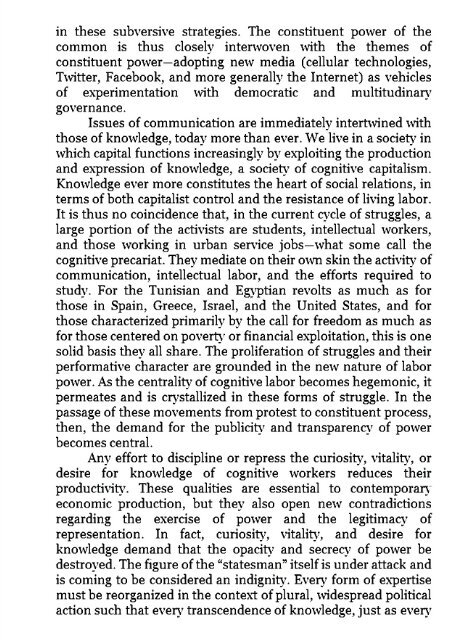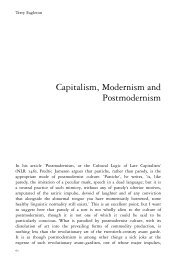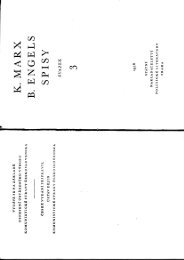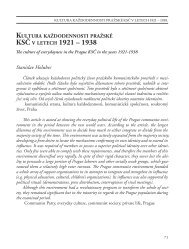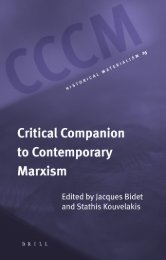Chapter 1: Subjective Figures of the Crisis ... - Negri in English
Chapter 1: Subjective Figures of the Crisis ... - Negri in English
Chapter 1: Subjective Figures of the Crisis ... - Negri in English
Create successful ePaper yourself
Turn your PDF publications into a flip-book with our unique Google optimized e-Paper software.
<strong>in</strong> <strong>the</strong>se subversive strategies. The constituent power <strong>of</strong> <strong>the</strong><br />
common is thus closely <strong>in</strong>terwoven with <strong>the</strong> <strong>the</strong>mes <strong>of</strong><br />
constituent power—adopt<strong>in</strong>g new media (cellular technologies,<br />
Twitter, Facebook, and more generally <strong>the</strong> Internet) as vehicles<br />
<strong>of</strong> experimentation with democratic and multitud<strong>in</strong>ary<br />
governance.<br />
Issues <strong>of</strong> communication are immediately <strong>in</strong>tertw<strong>in</strong>ed with<br />
those <strong>of</strong> knowiedge, today more than ever. We live <strong>in</strong> a society <strong>in</strong><br />
which capital functions <strong>in</strong>creas<strong>in</strong>gly by exploit<strong>in</strong>g <strong>the</strong> production<br />
and expression <strong>of</strong> knowiedge, a society <strong>of</strong> cognitive capitalism.<br />
Knowiedge ever more constitutes <strong>the</strong> heart <strong>of</strong> social relations, <strong>in</strong><br />
terms <strong>of</strong> both capitalist control and <strong>the</strong> resistance <strong>of</strong> liv<strong>in</strong>g labor.<br />
It is thus no co<strong>in</strong>cidence that, <strong>in</strong> <strong>the</strong> current cycle <strong>of</strong> struggles, a<br />
large portion <strong>of</strong> <strong>the</strong> activists are students, <strong>in</strong>tellectual workers,<br />
and those work<strong>in</strong>g <strong>in</strong> urban service jobs—what some call <strong>the</strong><br />
cognitive precariat. They mediate on <strong>the</strong>ir own sk<strong>in</strong> <strong>the</strong> activity <strong>of</strong><br />
communication, <strong>in</strong>tellectual labor, and <strong>the</strong> efforts required to<br />
study. For <strong>the</strong> Tunisian and Egyptian revolts as much as for<br />
those <strong>in</strong> Spa<strong>in</strong>, Greece, Israel, and <strong>the</strong> United States, and for<br />
those characterized primarily by <strong>the</strong> call for freedom as much as<br />
for those centered on poverty' or f<strong>in</strong>ancial exploitation, this is one<br />
solid basis <strong>the</strong>y all share. The proliferation <strong>of</strong> struggles and <strong>the</strong>ir<br />
performative character are grounded <strong>in</strong> <strong>the</strong> new nature <strong>of</strong> labor<br />
power. As <strong>the</strong> centrality <strong>of</strong> cognitive labor becomes hegemonic, it<br />
permeates and is crystallized <strong>in</strong> <strong>the</strong>se forms <strong>of</strong> struggle. In <strong>the</strong><br />
passage <strong>of</strong> <strong>the</strong>se movements from protest to constituent process,<br />
<strong>the</strong>n, <strong>the</strong> demand for <strong>the</strong> publicity and transparency <strong>of</strong> power<br />
becomes central.<br />
Any effort to discipl<strong>in</strong>e or repress <strong>the</strong> curiosity, vitality, or<br />
desire for knowiedge <strong>of</strong> cognitive workers reduces <strong>the</strong>ir<br />
productivity. These qualities are essential to contemporary'<br />
economic production, but <strong>the</strong>y also open new contradictions<br />
regard<strong>in</strong>g <strong>the</strong> exercise <strong>of</strong> power and <strong>the</strong> legitimacy <strong>of</strong><br />
representation. In fact, curiosity, vitality, and desire for<br />
knowiedge demand that <strong>the</strong> opacity and secrecy <strong>of</strong> power be<br />
destroyed. The figure <strong>of</strong> <strong>the</strong> "statesman" itself is under attack and<br />
is com<strong>in</strong>g to be considered an <strong>in</strong>dignity. Every form <strong>of</strong> expertise<br />
must be reorganized <strong>in</strong> <strong>the</strong> context <strong>of</strong> plural, widespread political<br />
action such that every transcendence <strong>of</strong> knowiedge, just as every


